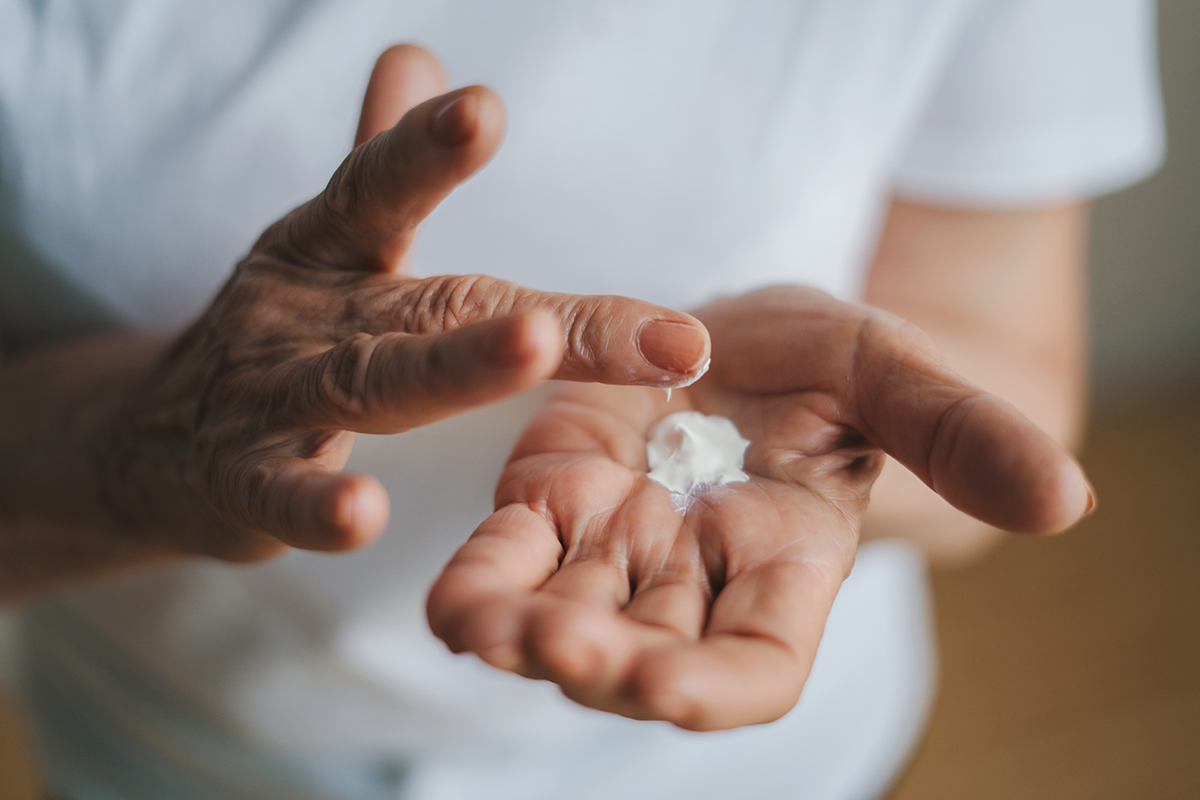Dermatologist-approved tips and products to soothe dry or sensitive skin

Skin is the body’s largest organ.1 So when it’s dry or sensitive, it may feel uncomfortable. But with a few simple habit changes and some helpful products, you can start feeling better in your skin.
Let’s start with the basics. Dry skin just means the skin doesn’t have enough moisture in its outer layers. It may get worse in cold weather, when there’s not much humidity in the air. But as people get older, it may become a year-round issue.2, 3
Why? Aging brings changes that make skin drier, says Beth G. Goldstein, M.D., a dermatologist and founder of Central Dermatology Center in Chapel Hill, North Carolina. And when skin gets dry, it may look rough or flaky, or it can itch.4
Skin may also become more sensitive with age. It may burn, sting or itch,5 says Dr. Goldstein. Some people are just born with sensitive skin. But aging causes the skin to get thinner. That may lead to increased sensitivity.6
There’s another reason that skin can become more irritated as women get older. When estrogen levels go down, the skin becomes more prone to eczema.6 And eczema can make skin drier and more sensitive, says Dr. Goldstein.
Whatever the cause of dry or sensitive skin, there are many ways to soothe it. Try these dermatologist-approved tips and over-the-counter (OTC) products.
How to protect dry or sensitive skin
Dry or sensitive skin needs extra TLC. Here’s how to keep it soft and hydrated, according to Dr. Goldstein.
Be gentle when washing
Soap can strip skin of the natural oils that keep it moist. Choose a gentle skin cleanser instead of soap.
Think warm, not hot.
Hot water dehydrates the skin. Use warm water when bathing, showering or washing your hands or face.
Moisturize often
Damp skin traps moisture better than dry skin. Rub on moisturizer right after getting out of the shower or bath. Then reapply it every time you wash your hands, body or face.
Slip on gloves
Extra contact with water can make skin drier. Protect the skin on your hands by using gloves when you wash the dishes or do other chores that get your hands wet.3
Consider creams and ointments
Lotions tend to contain more water than oil. Creams and ointments have more oil, which locks in more moisture. “Some people prefer the feel of a lighter lotion,” Dr. Goldstein explains. “But ointments and creams are the most hydrating.”
If skin is red, scaly or cracked, she suggests using a healing ointment or repair cream. Use either product on the hands at night. You can even slip on cotton gloves over your hands. The ointment will soak in overnight.
Use sunscreens designed for sensitive skin
“As a dermatologist, I am always going to say use sun protection,” Dr. Goldstein says. For people with sensitive skin, she suggests a mineral-based one.
If you do get a sunburn, aloe vera gel may help cool the burn.7
Look for ingredients that are good for dry or sensitive skin
There are many skin care ingredients that may help soothe irritated skin. They may be printed right on the front. Or you can check the ingredients list on the back of the label.
Here are the ingredients that can help (and why):
- Beta hydroxy acids help boost your skin’s ability to hold onto moisture. But don’t use them when the skin is actively inflamed, says Dr. Goldstein.
- Ceramides help build back the skin barrier, the protective layer on the skin’s surface that prevents irritants from getting in. This ingredient repairs the skin without causing further irritation.8
- Colloidal oatmeal is good for calming inflamed skin, so add it to a bath.
- Emollients fill the spaces in the skin cells that have been damaged, says Dr. Goldstein. Almond oil and shea or cocoa butter are emollients that help moisturize.
- Humectants attract water from the air into the skin. They include glycerin and hyaluronic acid.
- Occlusives are protective ingredients that sit on the top layer of skin to trap moisture. Petroleum jelly and mineral oil are examples of occlusives. These ingredients can feel greasy, so if you don’t like how they feel on your face, try them on your hands, says Dr. Goldstein.
Stay away from these ingredients if you have sensitive skin
Certain ingredients in products can irritate sensitive skin more than others. These include:
- Fragrances can be irritating, and they may also cause allergic reactions, says Dr. Goldstein. Instead, go for fragrance-free skin products.9
- Glycolic acid is a type of alpha hydroxy acid that can be too harsh on touchy skin.10
- Alcohol, which may be listed on labels as ethanol, may sting.9
Treating dry or sensitive skin requires a little extra effort. But with gentle care and the right over-the-counter products, it — and you — can feel more comfortable. If you’ve tried all of these tips and your skin is still giving you problems, it may be best to see a dermatologist.
